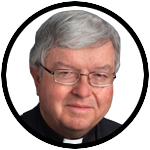
Father Kenneth Doyle
Q. I attended a presentation by a Catholic deacon on end-of-life issues and medical ethics. If I understood correctly, he emphasized that when a person has had a stroke, even if he is not expected to live long, it is still necessary to provide oxygen, nutrition and hydration. For nutrition, he said a feeding tube should be inserted.
To me, that seems an extraordinary means; it is invasive, can cause infection and needs to be changed regularly. As for me, if death were fairly imminent, I would not want a feeding tube if I were unable to swallow pureed food.
So my question is: Must a person, if Catholic, allow a feeding tube? (Now that my husband and I are past the age of 75, we are beginning to think about these things.) (Port St. Lucie, Florida)
[hotblock]
A. The answer to your question, “Must a Catholic allow a feeding tube?” is, “Not always.” In most situations — in the view of Catholic theology — medically assisted nutrition and hydration constitutes an ordinary means of treatment and would morally be required for those who cannot take food orally (even for patients in a “persistent vegetative state.”)
That presumption, however, can be overridden by the circumstances in a particular case. This exception to the general rule is well-expressed in a document authored by the Catholic bishops of New York state entitled “Now and at the Hour of Our Death,” which states:
“When death is imminent (within days) or in rare instances when a gastric feeding tube may cause intractable side effects such as severe agitation, physical discomfort, aspiration into the lungs or severe infection, any foreseeable benefits of maintaining the tube are likely outweighed in light of the attending burdens.”
Q. Has the church ever considered Mother Angelica for sainthood? I recently read a book on her life, and she was an amazing woman. She not only started the Eternal Word Television Network (EWTN), but she had a radio station as well. I am sure that her strong faith, humor and common sense have touched many people. (Thornville, Ohio)
A. Mother Angelica, a member of the Poor Clares of Perpetual Adoration, died in Alabama on Easter Sunday 2016 at age 92. In 1981, with $200 in capital, she had founded the Eternal Word Television Network, which today reaches more than 200 million homes in 145 countries and transmits 24 hours a day in several different languages with a variety of religious programming, including interviews, historical pieces and devotional services.
Three days after her death, Pope Francis spoke to members of the EWTN staff in Rome and, pointing to the sky, said of Mother Angelica, “She is in heaven.” A formal process of canonization, though, has yet to begin and normally does not start until five years after death — although exceptions have been made recently for St. Teresa of Kolkata and for St. John Paul II.
In 2009, Pope Benedict XVI conferred on Mother Angelica the highest papal honor for laypeople and clergy, the Pro Ecclesia et Pontifice Cross. Upon her death in 2016, tributes came from many Catholic leaders, including Archbishop Joseph E. Kurtz, then-president of the U.S. bishops’ conference, who said that Mother Angelica “reflected the Gospel commission to go forth and make disciples of all nations” and that, “like the best evangelists, she used the communications tools of her time to make this happen.”
***
Questions may be sent to Father Kenneth Doyle at askfatherdoyle@gmail.com and 30 Columbia Circle Dr., Albany, New York 12203.
PREVIOUS: Easter calls each of us to be witnesses of Christ’s saving power
NEXT: ‘Schizoid’ world brags it’s free while chained to greed, pope says



Share this story